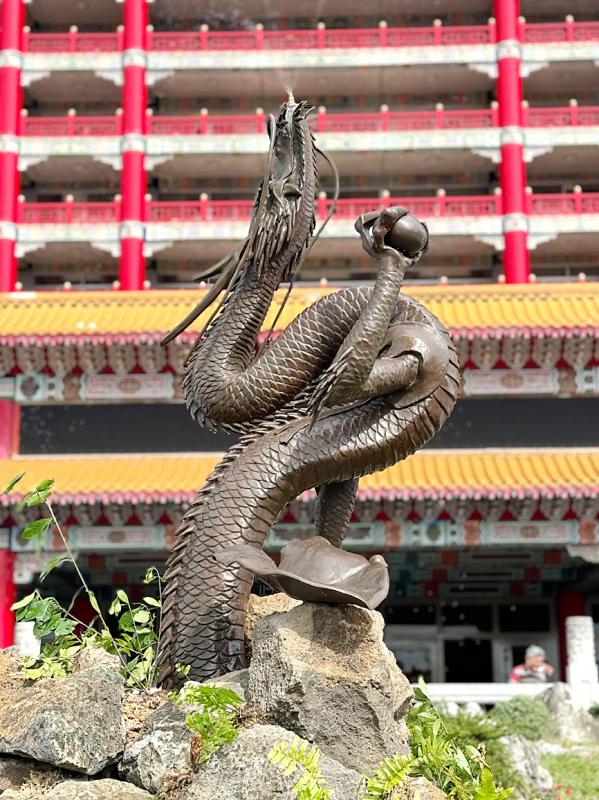The Grand Hotel Taipei on Thursday unveiled a new fountain with a different version of the establishment’s signature dragon statue that replicated the monument’s original appearance during the Japanese colonial era.
Last year, a piece of the hotel’s ceiling fell on the dragon and broke off its head, necessitating a restoration project that led to the discovery that the statue’s form had been altered, a hotel representative said.
The Taiwan Shinto Temple, which formerly occupied the hotel’s site, built a fountain with a brass dragon sprinkler in 1919, they said, adding the statue was dismantled and reassembled during the hotel’s construction.

Photo: Tsai Yun-jung, Taipei Times
In 1956, the dragon statue was moved indoors following a renovation of the hotel’s interior, and another renovation in 1987 led to the statue being gilded with pure gold, they said.
Following the incident last year, the restoration team discovered signs of alterations to the monument’s structure, leading to a second dragon statue being built to honor the original design, they said.
The head of the fountain’s dragon statue is raised, with its horns lengthened and a claw clutching a globe, sculptor Pu Hao-ming (蒲浩明) said.
The new monument was created by lost-wax casting, the technique used by Shizumi Saitou, the sculptor who made the original, he said.
Saitou’s metalworking prowess was evidenced by parts of the statue that were no thicker than 3mm, Pu said.
The final creation was 25 percent larger than the original to make better use of the hotel’s capacious garden, he said.
The project utilized 3D scanning and modeling technology to recreate the monument’s former appearance from old photographs, said Wang Tso-jung (王佐榮), a published author of popular history.
The decision was made to create a second iteration of the statue, because the golden dragon was an iconic part of the establishment’s history, said former hotel chairman Lin Yu-sheng (林育生), who headed the project.
The recreation of the colonial-period dragon is an homage to the nation’s cultural heritage, hotel chairwoman Yeh Chu-lan (葉菊蘭) said, adding that the Grand Hotel Taipei is an establishment that bore witness to Taiwan’s history.

An essay competition jointly organized by a local writing society and a publisher affiliated with the Chinese Communist Party (CCP) might have contravened the Act Governing Relations Between the People of the Taiwan Area and the Mainland Area (臺灣地區與大陸地區人民關係條例), the Mainland Affairs Council (MAC) said on Thursday. “In this case, the partner organization is clearly an agency under the CCP’s Fujian Provincial Committee,” MAC Deputy Minister and spokesperson Liang Wen-chieh (梁文傑) said at a news briefing in Taipei. “It also involves bringing Taiwanese students to China with all-expenses-paid arrangements to attend award ceremonies and camps,” Liang said. Those two “characteristics” are typically sufficient

A magnitude 5.9 earthquake that struck about 33km off the coast of Hualien City was the "main shock" in a series of quakes in the area, with aftershocks expected over the next three days, the Central Weather Administration (CWA) said yesterday. Prior to the magnitude 5.9 quake shaking most of Taiwan at 6:53pm yesterday, six other earthquakes stronger than a magnitude of 4, starting with a magnitude 5.5 quake at 6:09pm, occurred in the area. CWA Seismological Center Director Wu Chien-fu (吳健富) confirmed that the quakes were all part of the same series and that the magnitude 5.5 temblor was

The brilliant blue waters, thick foliage and bucolic atmosphere on this seemingly idyllic archipelago deep in the Pacific Ocean belie the key role it now plays in a titanic geopolitical struggle. Palau is again on the front line as China, and the US and its allies prepare their forces in an intensifying contest for control over the Asia-Pacific region. The democratic nation of just 17,000 people hosts US-controlled airstrips and soon-to-be-completed radar installations that the US military describes as “critical” to monitoring vast swathes of water and airspace. It is also a key piece of the second island chain, a string of

The Central Weather Administration has issued a heat alert for southeastern Taiwan, warning of temperatures as high as 36°C today, while alerting some coastal areas of strong winds later in the day. Kaohsiung’s Neimen District (內門) and Pingtung County’s Neipu Township (內埔) are under an orange heat alert, which warns of temperatures as high as 36°C for three consecutive days, the CWA said, citing southwest winds. The heat would also extend to Tainan’s Nansi (楠西) and Yujing (玉井) districts, as well as Pingtung’s Gaoshu (高樹), Yanpu (鹽埔) and Majia (瑪家) townships, it said, forecasting highs of up to 36°C in those areas